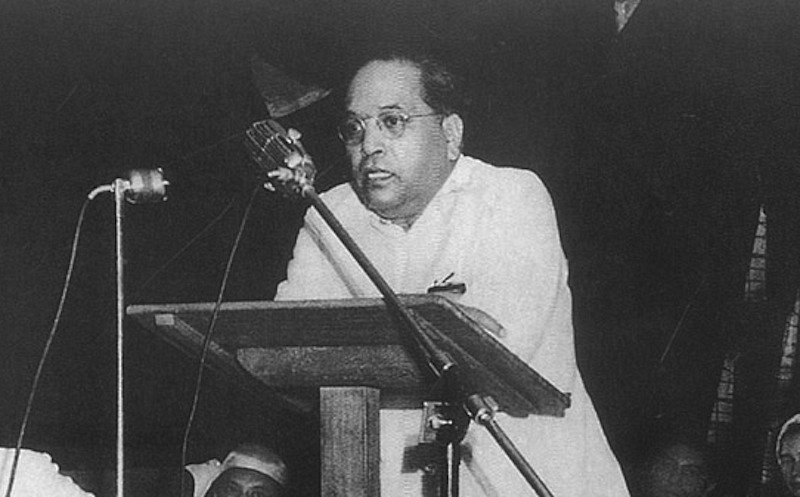Ideas
In The Long Run, We Are All Beholden To Ambedkar
- Most political lives diminish in sheen after their time. But what is it about Ambedkar that his persona and his influence amongst Indians is bigger today than arguably any of his contemporaries?

Ambedkar
As various political parties, groups and the state prepares to celebrate the 126th birth anniversary of Dr B.R Ambedkar today (14 April), in the 70th year of India’s Independence, the reading on the wall can’t be missed.
Ambedkar today looms larger than ever in the India’s socio-political consciousness. The appeal of Ambedkar has now begun to overshadow that of his more famous contemporaries like Nehru and even Gandhi. In fact, it will not be an overstatement that among the founding fathers of the Republic of India, it is only the legacy of Ambedkar which not only endured but has strengthened over the years.
What is this legacy?
Is it possible to define it in one word?
It is a herculean task indeed to define the legacy of a multi-dimensional leader who wore several hats. The first Indian to do a PhD in Economics, a fine administrator, a lawyer, a politician, a social reformer, a philosopher, a historian and a man who revived Buddhism in India.
But we can use his own words to encapsulate the reasons of his enduring appeal— it’s the dream of a Prabuddha Bharat (Enlightened India).
Ambedkar imagined a post-caste egalitarian India for he realised that a society divided into castes has little hope of survival in the modern world-order dominated by nations and nation-states. He realised, too, that the caste system forms the most formidable obstacle in the creation of a modern Indian nation as it has converts each and every village into an arena of permanent civil war.
It is the path he chose for transforming the society which makes him stand apart from revolutionaries across the world. It was his unwavering faith in democracy and the constitutional path, which kept him unwavering in the fight for an egalitarian society where people, irrespective of their caste or creed are were ensured social, economic and political freedom. For Ambedkar, democracy was a system to enact revolutionary socio-political transformation without bloodshed.
And given the defining influence of Ambedkar among the people of India especially the subaltern castes and communities, this faith in democracy has percolated down the Indian society. It is not sufficiently realised that one of the major reasons of the failure of radical ideologies like Maoism— which advocate armed vandalism in India—is the path defined by Ambedkar. He is among those who laid the foundation of modern democracy in this country. This is not surprising because unlike many in his times Ambedkar strongly contended the idea that democracy and democratic principles are a Western import and argued instead that they are rooted in the history and traditions of India.
He was also among those few people who fully grasped the importance of industrialisation and modernisation. Unlike the Gandhian fetish of villages, Ambedkar was an advocate of modern industry and urbanisation, something he saw as a necessity to create conditions for social transformation. He was a critic of Nehru’s economic and foreign policy which not only limited India’s potential to leapfrog into the future but also isolated it among the community of nations.
Though Ambedkar emphasised the spread of modern education and technical skills among the masses, he also placed strong emphasis on the moral education and character-building of the new generations. He drafted the Hindu Code Bill and even though it couldn’t be passed in its entirety, the same provisions were later passed as a series of laws validating Ambedkar’s idea of the desired social reforms in the Hindu society.
He was among those few who could gaze into the future and understand that socio-religious and political reforms were not only desirable but necessary for India to attain independence and re-emerge from obscurity it had been relegated to for centuries.
But after his death, Ambedkar too was relegated to a passing mention as the chairman of the Drafting Committee of the Constitution and a Dalit leader. In 2012, a poll was conducted by the Outlook magazine in partnership with CNN-IBN to decide the greatest Indian ‘after Gandhi’, as the post of the greatest Indian was reserved for Bapu. In that, it was Ambedkar who garnered the maximum popular vote and led the panel with 1,991,735 votes. The ‘jury of experts’, however, went ahead and crowned Nehru as the greatest Indian even when he had only secured 9,921 votes.
Ambedkar did not have an army of ‘court’ historians like Nehru or Gandhi. Greatness, however, is self-evident. Look where they are today and where is Ambedkar…..
Support Swarajya's 50 Ground Reports Project & Sponsor A Story
Every general election Swarajya does a 50 ground reports project.
Aimed only at serious readers and those who appreciate the nuances of political undercurrents, the project provides a sense of India's electoral landscape. As you know, these reports are produced after considerable investment of travel, time and effort on the ground.
This time too we've kicked off the project in style and have covered over 30 constituencies already. If you're someone who appreciates such work and have enjoyed our coverage please consider sponsoring a ground report for just Rs 2999 to Rs 19,999 - it goes a long way in helping us produce more quality reportage.
You can also back this project by becoming a subscriber for as little as Rs 999 - so do click on this links and choose a plan that suits you and back us.
Click below to contribute.
Latest